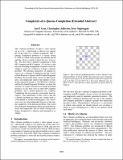Complexity of n-Queens completion (extended abstract)
Abstract
The n-Queens problem is to place n chess queens on an n by n chessboard so that no two queens are on the same row, column or diagonal. The n-Queens Completion problem is a variant, dating to 1850, in which some queens are already placed and the solver is asked to place the rest, if possible. We show that n-Queens Completion is both NP-Complete and #P-Complete. A corollary is that any non-attacking arrangement of queens can be included as a part of a solution to a larger n-Queens problem. We introduce generators of random instances for n-Queens Completion and the closely related Blocked n-Queens and Excluded Diagonals Problem. We describe three solvers for these problems, and empirically analyse the hardness of randomly generated instances. For Blocked n-Queens and the Excluded Diagonals Problem, we show the existence of a phase transition associated with hard instances as has been seen in other NP-Complete problems, but a natural generator for n-Queens Completion did not generate consistently hard instances. The significance of this work is that the n-Queens problem has been very widely used as a benchmark in Artificial Intelligence, but conclusions on it are often disputable because of the simple complexity of the decision problem. Our results give alternative benchmarks which are hard theoretically and empirically, but for which solving techniques designed for n-Queens need minimal or no change.
Citation
Gent , I P , Jefferson , C A & Nightingale , P W 2018 , Complexity of n-Queens completion (extended abstract) . in J Lang (ed.) , Proceedings of the Twenty-Seventh International Joint Conference on Artificial Intelligence . International Joint Conferences on Artificial Intelligence , pp. 5608-5611 , 27th International Joint Conference on Artificial Intelligence and the 23rd European Conference on Artificial Intelligence , Stockholm , Sweden , 13/07/18 . https://doi.org/10.24963/ijcai.2018/794 conference
Publication
Proceedings of the Twenty-Seventh International Joint Conference on Artificial Intelligence
Type
Conference item
Description
We would like to thank the EPSRC for partially funding this work through grants EP/K015745/1, EP/M003728/1, and EP/P015638/1. In addition, Dr Jefferson is funded by a Royal Society University Research Fellowship.Collections
Items in the St Andrews Research Repository are protected by copyright, with all rights reserved, unless otherwise indicated.

